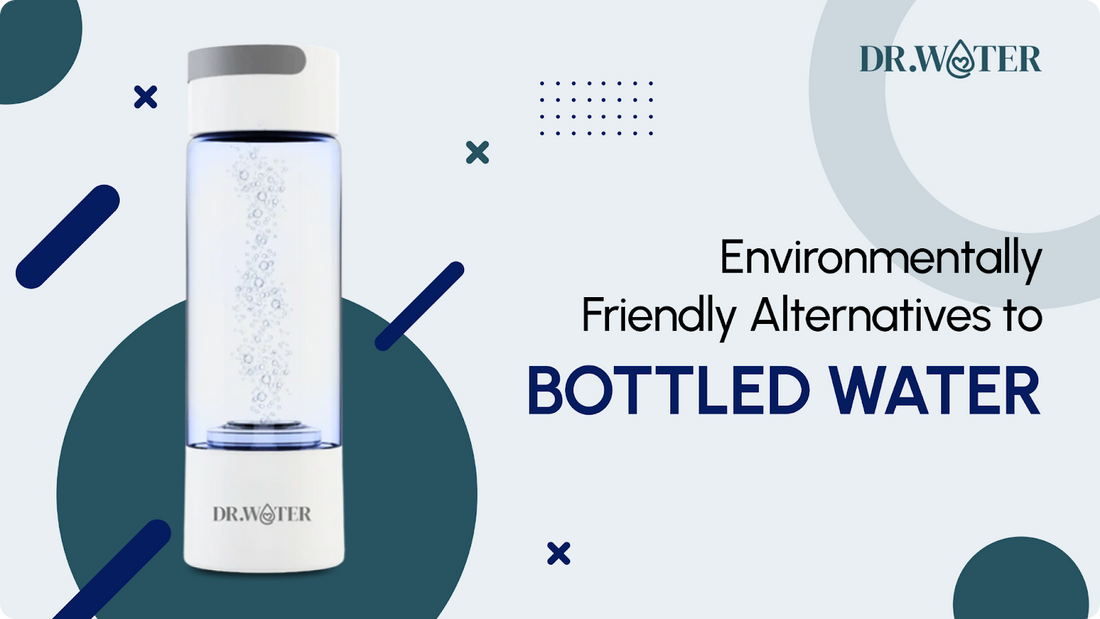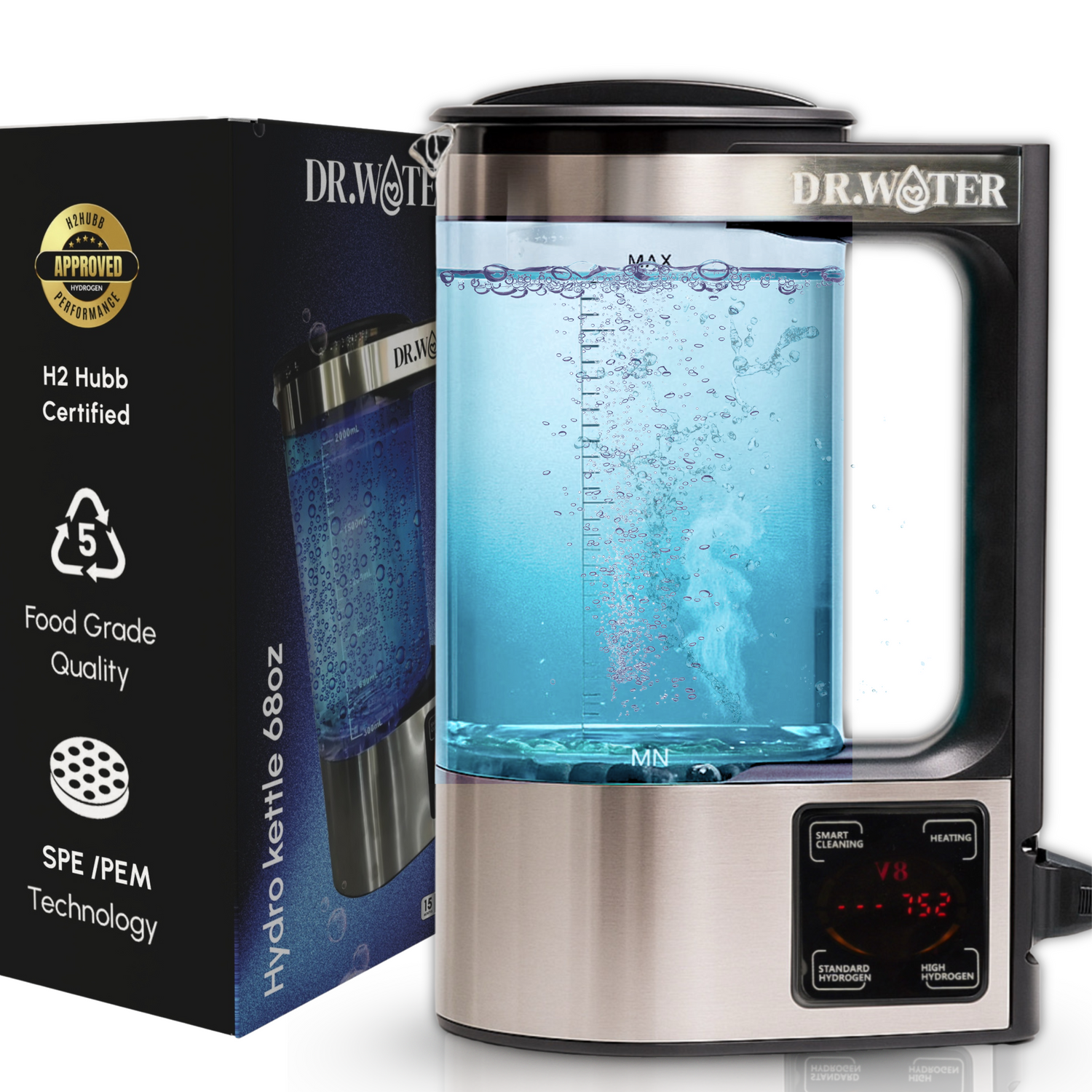
Environmentally Friendly Alternatives to Bottled Water
Share
Summary
|
The global bottled water industry produces over 600 billion plastic bottles each year, with only around 9% of plastic waste actually being recycled. The rest often ends up in oceans or landfills, contributing to microplastic pollution, climate change, and long-term harm to wildlife and ecosystems.
For those genuinely looking for the most sustainable bottled water options, switching to a reusable system is one of the most effective lifestyle changes you can make. This guide walks you through the best materials for reusable bottles, new hydration technologies, and how to find a solution that supports both your health and the planet.
Why Move Away from Bottled Water?
Single-use plastic bottles are incredibly resource-intensive. According to the Pacific Institute, producing just one liter of bottled water consumes three liters of water in total, along with fossil fuels, chemicals, and energy throughout manufacturing and transportation.
The environmental cost is steep:
- 17 million barrels of oil are used each year to produce plastic bottles in the U.S. alone.
- It takes 450 years for a plastic bottle to decompose.
- Over 8 million tons of plastic enter the oceans annually.
In contrast, a one-time investment in a durable, eco-friendly bottle can last for years and save hundreds of bottles from entering the landfills. Lately, Gen Z has really pushed the trend of using reusable water bottles.
They’re not just about being eco-conscious, but also about having a bottle that’s stylish and sustainable. It’s clear that younger people are prioritizing more environmentally friendly choices in their daily lives. If you're serious about finding the most sustainable bottled water replacement, it starts with choosing the right material.
Comparing Reusable Bottle Materials
Every material used for reusable water bottles comes with trade-offs between durability, safety, insulation, and environmental impact. Below is a breakdown of the most common materials used and what makes each unique.
1. Stainless Steel
- Stainless steel is widely regarded as the most durable and versatile option.
- It is fully recyclable, corrosion-resistant, and maintains water temperature much longer than other materials.
- Unlike plastic, it doesn’t leach harmful chemicals and can withstand rough use for years.
- Used properly, stainless steel bottles can last 10–15 years. Plus, they require fewer replacements, which makes them one of the most sustainable bottled water alternatives in the long term.
2. Glass
- Glass bottles are ideal for those seeking a pure, taste-neutral drinking experience.
- They are fully recyclable and chemically inert, meaning they won’t alter your water’s flavor or leach microplastics.
- However, they’re also heavier and more fragile, making them less ideal for active or outdoor lifestyles.
- To compensate, many brands use protective silicone sleeves or tempered glass, improving shock resistance without compromising safety.
3. BPA-Free Plastic
- BPA-free plastics (like polypropylene or polyethylene) are lightweight, affordable, and resistant to breaking.
- They're a step up from single-use bottles but still lack the lifespan and recyclability of metal or glass options.
- While safer than legacy plastics, they may still degrade over time and are often downcycled rather than fully recycled.
4. Tritan
- Tritan is a newer generation of BPA-free plastic, developed to be clear, odor-resistant, and more durable.
- It offers a plastic-like feel with better longevity, and it doesn’t leach estrogenic compounds like older plastics.
- However, it remains petroleum-derived and less sustainable than metal or glass when looking at full lifecycle impacts.
Here’s a quick overview of the best materials for bottled water.
An At-A-Glance Comparison of Each Material
The Role of Smart Hydration Systems
Modern reusable bottles aren’t just about avoiding plastic waste, they now combine technology, wellness, and durability into one. Smart hydration systems are leading this change, especially hydrogen-generating water bottles like the Dr. Water HydroStanley.
- Hydrogen Generation: Using electrolysis, these bottles infuse water with hydrogen molecules, offering benefits such as improved skin health, reduced oxidative stress, and better overall hydration.
- Sustainability: Hydrogen-rich water bottles reduce the need for bottled hydrogen water, helping cut down plastic waste and carbon emissions from manufacturing and shipping.
- Health Benefits: Hydrogen-infused water acts as a powerful antioxidant, reducing fatigue, combating oxidative stress, and supporting cognitive function for better mental clarity and energy levels.
- Convenience: With bottles like the HydroStanley, you can carry hydrogen-enriched water wherever you go, making it easy to stay hydrated and healthy on-the-go without relying on packaged water.
This makes them one of the most sustainable bottled water alternatives, not just because they reduce waste, but because they eliminate the need to buy packaged hydrogen water altogether.
Why Hydrogen Water?
Hydrogen water is regular water infused with molecular hydrogen (H₂), a gas that has shown promise in neutralizing harmful free radicals in the body. Unlike minerals or additives, hydrogen doesn’t alter the taste or texture of water, but it may enhance its health benefits. Here are some of the most popular benefits of hydrogen water.
Key Benefits of Hydrogen Water
- Antioxidant effects: Helps reduce oxidative stress, which is linked to aging and chronic disease.
- Improved recovery: May reduce muscle fatigue and inflammation after exercise.
- Supports metabolism: Some early studies suggest improved energy levels and metabolic function.
- Brain health: Potential neuroprotective benefits in early research on cognitive function.
- Gut balance: May support gut flora and reduce inflammation in the digestive system.
While more research is still emerging, the results so far are promising, especially when combined with the environmental benefits of using a long-lasting, plastic-free bottle.
Also read: Top 10 health benefits of hydrogen water
Why Hydrogen Bottles Like Dr. Water HydroStanley Make Sense?
From a sustainability angle, hydrogen water bottles replace two things at once: single-use plastic bottles and store-bought hydrogen drinks, which often come in cans or plastic pouches. These packaged options are wasteful, expensive, and have a limited shelf life for retaining active hydrogen.
In contrast, a smart bottle like the HydroStanley lets you:
- Create fresh hydrogen water on demand, anytime, anywhere
- Avoid waste from pre-packaged wellness drinks
- Use a durable borosilicate glass build that lasts for years
- Cut down on transportation emissions from shipping bottled beverages
This is why hydrogen-generating bottles are increasingly being seen not just as a wellness tool, but as part of a larger movement toward functional sustainability, where products are designed to improve both personal and planetary health.
Choosing the Right Eco-Friendly Bottle
Switching away from single-use plastic can feel overwhelming. With so many materials, features, and brands on the market, it’s easy to feel unsure about which bottle truly aligns with your values and lifestyle. A little upfront research can help you make a choice that’s both sustainable and practical in the long run.
When comparing reusable bottles, especially for daily use, consider these key factors:
- Material quality and lifespan: Choose bottles made to last for years without degrading or leaching chemicals. Stainless steel and glass tend to offer the longest usable life.
- Insulation performance: If temperature control matters to you, look for bottles with double-walled insulation to keep drinks hot or cold for extended periods.
- Ease of cleaning: Wide-mouth designs and dishwasher-safe materials make maintenance easier and reduce buildup over time.
- Functional extras: Features like built-in hydrogen generation, UV sterilization, or advanced filtration can enhance both health and convenience.
- Certifications and safety: Always check for third-party tested claims such as BPA-free, food-grade stainless steel, or FDA-approved materials.
Keep these points in mind when you are shopping for a sustainable, reusable water bottle.
Also Read: How to properly clean and maintain your hydrogen water bottle
Conclusion
Finding the most sustainable bottled water solution doesn’t mean sacrificing convenience or function. It just means rethinking your daily hydration habits and investing in tools that support both your body and the environment.
Reusable water bottles, especially smart systems like the Dr. Water HydroStanley, allow you to eliminate hundreds of plastic bottles annually while enjoying cleaner, more functional water. Whether you're commuting, traveling, or just working at your desk, there are now practical, tech-forward options that help you stay true to your values.
Frequently Asked Questions
Q: How does using a reusable water bottle compare to bottled water in terms of environmental impact over time?
A: Over time, reusable water bottles significantly reduce plastic waste compared to single-use plastic bottles. While plastic bottles are often recycled inefficiently, reusable bottles made of stainless steel or glass have a much lower environmental footprint when reused properly. The real environmental benefit is seen in long-term use.
Q: Are there environmentally friendly water filtration systems that reduce reliance on bottled water for clean drinking water?
A: Yes, home water filtration systems like reverse osmosis filters or activated carbon pitchers can provide clean, purified water without the need for bottled water. These systems not only cut down on plastic waste but also reduce the carbon footprint associated with bottling and shipping water.
Q: What are the benefits of opting for biodegradable or plant-based water bottles instead of traditional plastic ones?
A: Biodegradable or plant-based water bottles made from materials like PLA (polylactic acid) break down naturally and are less harmful to the environment than conventional plastic bottles. While they are still single-use, they decompose faster and release fewer toxins, offering an eco-friendly alternative to traditional plastic.

